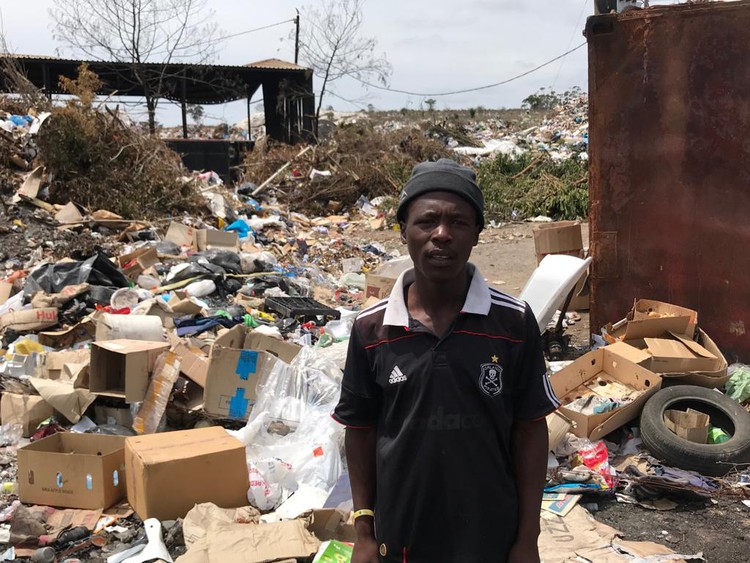Reconsidering South Africa’s approach to waste pickers
Waste pickers must be integrated into the formal waste management sector, says researcher
Fistoz Notyawa, 28, is a waste picker who lives on a landfill in Makhanda (formerly Grahamstown) in the Eastern Cape. He collects recyclable material to sell to scrap yards and buyback centres. He moved to the landfill in 2015 from Joza, a township in Makhanda. He works eight to ten hours a day, making between R60 and R140.
Notyawa, like the majority of the estimated 100,000 waste pickers in South Africa, started waste picking to stay off the streets and provide for himself in a country with an unemployment rate of 27.1%.
Professor Rinie Schenck is based at the University of the Western Cape and researches waste management. She says that informal waste pickers recycle 90% of the recyclables collected from households in South Africa. This possibly saves municipalities up to R750 million in landfill space every year.
South Africa has a national waste strategy. The 2011 version of this recognised the importance of waste pickers in the the recycling process, but did not provide municipalities with guidelines for integrating waste pickers into the formal economy. “Some municipalities ban all waste pickers while others try to accommodate them,” says Schenck.
Notyawa says that Makana municipality treats waste pickers like they are criminals. “The municipality does nothing [to help us]. They used to chase us away, but the owner of the scrap yard convinced them to let us stay.” Attempts to get comment from Makana municipality were unsuccessful.
Waste pickers face many challenges working in the informal waste economy: they are prevented from access to landfills in some municipalities, stigmatised by government and the public, exposed to unhealthy working conditions and vulnerable to volatile price changes on the scrap market.
Schenck says that the only way to overcome these challenges is to integrate waste pickers into the formal waste management sector.
Integrating waste pickers
Melanie Samson of Wits University has been working on a project called “Lessons from Waste Picker Integration Initiatives”. It is funded by the Department of Science and Technology, as well as the Department of Environmental Affairs which is developing national guidelines for waste picker integration.
The guidelines are being worked on by representatives from waste picker organisations, municipalities, industry, government and NGOs. They are expected to be finalised in April 2019.
Samson says that a major challenge has been that each party has a different understanding of the existing recycling system. She says it is important to develop a common understanding with waste pickers sharing their experiences.
Samson has looked to Latin American countries for examples. “In countries like Brazil, Columbia and Argentina, you have well-developed models where cities pay for their service,” says Samson. “When a municipality contracts private companies to recycle, they pay the company a collection fee, while waste pickers [in South Africa] are not paid for the collection services they provide.”
According to Samson, a vital part of waste picker integration is their participation in decision making within the waste management process and recognition of the public service they supply. It also requires what Samson calls “social integration”. She says government and industry need to “transform how waste pickers are seen, appreciated and valued by residents, industry and government officials.”
Support independent journalism
Donate using Payfast

Don't miss out on the latest news
We respect your privacy, and promise we won't spam you.
Next: Forget cigarette smuggling. The big money is in stealing coal
Previous: Eastern Cape residents must make way for taxi rank
Letters
Dear Editor
To assist the waste pickers they should be recognised as waste pickers and an essential part of the disposable waste process. They should be registered, get given a uniform, bags should be distributed to households to dispose of their plastic, cardboard, paper and glass so that the recyclable material is semi sorted.
The bags should be out on the curb for the waste pickers to collect at their leisure. They should also be paid on delivery of each bag depending on its contents. If this is put in place, we will then have a system and a cycle in place where we recognise who the waste pickers are and that they are earning an honest keep.
Dear Editor
I'm a waste picker based in Buffalo City Municipality, Eastern Cape. We are struggling here for real. We are not recognised by the councillors or the waste management department! There are a lot of opportunities here in terms of job creation.
© 2019 GroundUp.
This article is licensed under a Creative Commons Attribution-NoDerivatives 4.0 International License.
You may republish this article, so long as you credit the authors and GroundUp, and do not change the text. Please include a link back to the original article.

